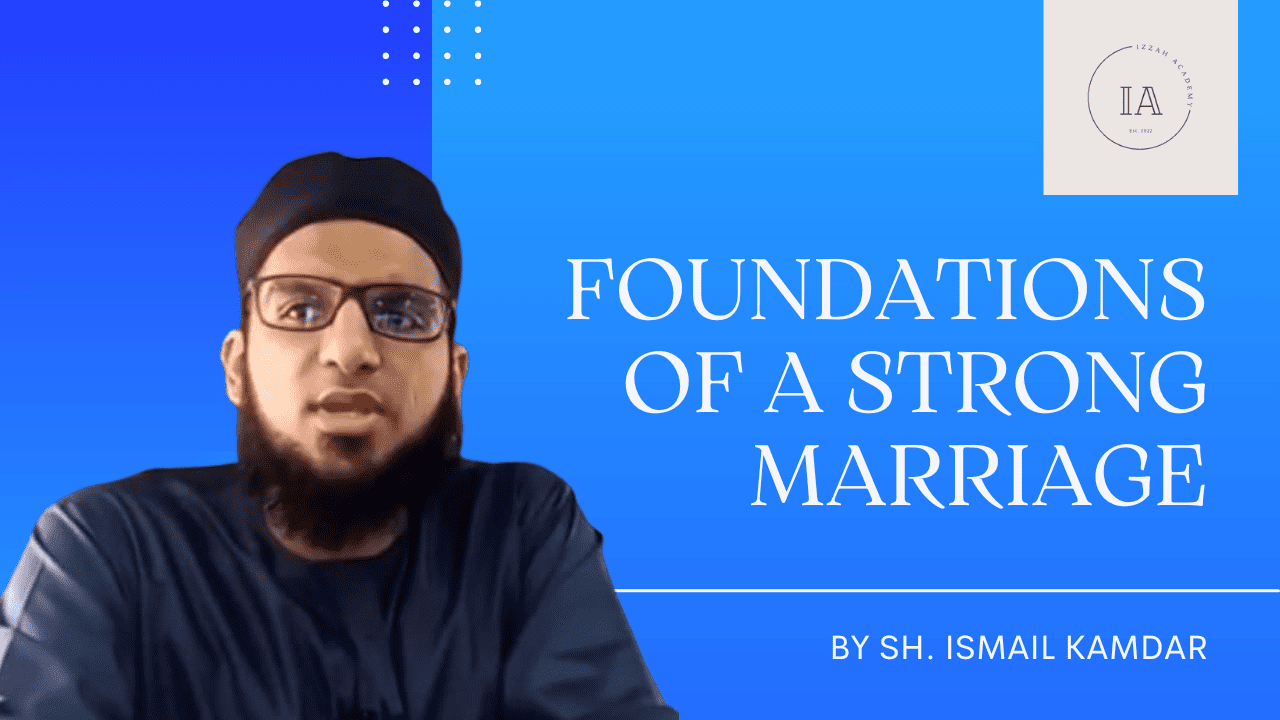Islam
Islamic Character as our Foundation
These days, many young Muslims fight over the technical details on what are the rights of the husband or wife. These disputes are heated, emotional and often devoid of any understanding of the Quran and Sunnah. Marriages are reduced to contracts in which rights are exchanged in a formal manner without any positive feelings towards the other. However, Islam does not encourage this kind of attitude towards relationships, whether it is a marital relationship or our relationships with our parents, siblings, children, friends, and neighbours. The focus in Islam is not on law, but on manners and character.
Islam lays down some very clear laws regarding relationships, but also leaves other aspects open to interpretation. For example, the hadith states that women must obey their husbands, but the details of what that entails are often decided by cultural and economic norms. Likewise, the Quran teaches that men must provide for their wives, but what exactly they need to provide and how much they should provide is dictated by cultural and economic norms, as well as individual needs. The laws exist to prevent abuse and to establish the parameters of the Shariah. Within these parameters, there is a lot of room for flexibility.
Islam’s laws related to marriage dictate the bare minimum that is required for a marriage to work. This has never been the standard recommended by the Shariah. That standard is a loving mutually beneficial relationship based on good character and kindness. Meeting the bare minimum does not make a person a righteous Muslim or an ideal spouse. If anything, it indicates laziness and a lack of commitment to the relationship. The true measure of success in a relationship is one’s character and manners with one’s spouse.
The Prophet said, “The best of you are the ones who are best to their families, and I am best to my family.” (Tirmidhi 3895) He also encouraged women to marry men of good character (Tirmidhi 1084) and emphasized in multiple narrations the importance of kindness in a marriage (Muslim 1218, 1468). All of these narrations clearly indicate that marriages are not built on meeting minimum Fiqh standards, marriages are built on kindness, good character, and wanting to please each other.
Our marriages should not be built on meeting minimum Fiqh standards or arguing over the details of the law. We need to clarify these laws so people know their rights and responsibilities, but we should build our marriages on kindness and love. This verse of the Qur’an should be the foundation of how we build our marriages, “And among His signs is this, that He created for you wives from among yourselves, that you may find peace in them, and He has put between you love and mercy.” (Surah al-Rum 30:21)
When Problems have no solutions
Life is hard. It is a testing ground in which we all face multiple trials. Some trials are easier to manage than others. Knowing that a trial has an end, that there is hope for solution, and that it will all be over soon, makes it easier to get through the difficult times. We remind ourselves that with hardship comes ease, and that victory comes with patience. When an end is in sight, we have more courage and hope which fuels our patience, and gets us through the trial.
But what about those trials that seem to have no end? How do we deal with a test that might last a lifetime? How do we make peace with the fact that sometimes there is no ease coming, there is no victory coming, and the test will not end until we leave this world? Whether it is a chronic illness, a tragic loss of a loved one, or an unjust lifetime imprisonment, many people are tested with trials that seem to have no end in sight. How do we deal with these trials?
Accepting One’s Qadar
And know that what has missed you was not meant for you, and what has befallen you was not going to miss you.
Hadith 19, 40 Hadith an-Nawawi
Destiny is a mystery that most human minds will fail to comprehend. We have limited free will and are responsible for our choices, but at the end of the day, nothing occurs unless Allah’s wills it. Allah already knows everything and has written all of our destinies for us. When we are faced with a trial that does not end and which we cannot comprehend, the best thing we can do at that point is to accept our destiny. This is what Allah has willed for us.
Nobody gets through life without facing some kind of trial. We all have to deal with tragedies and trauma that is beyond our control. Yet we find solace in the concept of destiny. Accepting that it was already written for us and that what has hit us was never meant to miss us brings some peace to the mind. It prevents from wishing if only I did something different, I could have changed my fate. What is done is done, we must accept that our current circumstance is our destiny and find a way to continue moving forward with our trials and pain.
Focusing on the Afterlife
One of the blessings of hardship is that they remind us to return to Allah and to focus on what truly matters. Our life in this world is short and soon we will all leave. When that happens, only our deeds and sincere intentions will go with us and benefit us in the Afterlife. A tragedy is a chance to realign our thinking. It is an opportunity to turn back to Allah and make preparation for the Afterlife our number one priority.
It is too easy to get distracted by our worldly goals, forgetting that the real victory is success on the Last Day. Our tragedies bring everything into perspective. They humble us, allowing us to see what really matters. No matter how difficult life gets in this world, if we continue to live in a way that is pleasing to Allah, the end result is Paradise and that is worth all the pain. So channel your energy into working for Paradise, and your trials will become blessings in the process.
Trusting Allah’s Plan
Allah is Most Wise, and whatever He wills is best for us. We must trust the plan of Allah. Like Yusuf in the prison, Ayub during his illness, and Yunus in the belly of the whale, our trust in Allah and connection with Allah should remain strong. “Allah knows best” should be our guiding thought. Sometimes a trial seems unsurmountable, but overcoming it is exactly what you need to level up and become a better version of yourself. Or maybe it is unsolvable, but your patience with it is your ticket to Paradise. Either way, we do not know but we do know that if we trust Allah’s plan, the end will always be in our favor.
Reflect on the story of Musa and Khidr. The owners of the ship that was damaged, the parents who lost their child, and the orphans who could not yet find their inheritance. None of them knew that these tragedies were in their favor and for their own long-term benefit. Allah’s Plans works in ways we cannot imagine. When life is tough, trust that Allah knows best and find peace through tawakul.
Buckets of Sabr
We will certainly test you with fear and hunger, and loss of wealth, lives and crops. So give good news to the resilient.
Quran 2:155
There is only one way forward through trials, and that is with Sabr. Sabr does not mean passively allowing people to oppress you. Sabr means being patient with what is beyond your control. Sabr means persistence in obeying Allah. Sabr means self-control when you desire to commit sins. Sabr means resiliency when life gets tough. Sabr is all of these things and more. Sabr should be the lifestyle of the believer, powering us through every test of life.
When life gets tough, we must be tougher than our trials. We must dig deep and find our inner strength to push through. No matter how difficult life gets, the pleasure of Allah must remain our goal. Patiently, we will accept our destiny, persevere in our good deeds, and face our trials with resiliency. Through sabr, lots and lots of sabr in all its forms, we will find peace, reward, and the pleasure of Allah.
Finding the Ease within the Hardship
When life gets hard, we have two choices: feel sorry for ourselves and give up or find a way to keep moving forward. There is no benefit in the first option. Defeat does not suit the believer. We will endure and keep moving forward. To do this, we will find the ease in our hardship. Life is tough but even in the toughest of times, there are many sources of comfort to power us through. During difficult times, seek out the good things in your life and cling to them as sources of comfort.
Find solace in your family and friends. If that is not possible, then find inner peace through worship and your relationship with Allah. Let your peace come internally, so that nobody can break it. Find the ease in your hardship, even if it is internal. Inner peace because of a strong relationship with Allah is all we need to get through our toughest trials.
Never Losing Hope
Do not despair of Allah’s Mercy. None despairs of Allah’s Mercy except the disbelieving people.
Quran 12:87
Never lose hope. Allah is there for you. He is with you in good times and bad times. Everything occurs as Allah has willed it, and sometimes we only see the fruit of our effort in the Afterlife. The believer does not lose hope in Allah’s mercy, knowing that miracles are possible, and even without a worldly victory, our patience will pay off in the next world. Paradise is worth the pain we endure in this life and that alone makes it worth every moment.
Be mindful of Allah and Allah will protect you. Be mindful of Allah and you will find Him in front of you. If you ask, then ask Allah [alone]; and if you seek help, then seek help from Allah [alone]. And know that if the nation were to gather together to benefit you with anything, they would not benefit you except with what Allah had already prescribed for you. And if they were to gather together to harm you with anything, they would not harm you except with what Allah had already prescribed against you. The pens have been lifted and the pages have dried.”
Hadith 19, 40 Hadith an-Nawawi
Our February Specials
If you find our articles beneficial, support Islamic Self Help by purchasing one of our online courses or ebooks. Check out our February Specials below:
Foundations of a Strong Marriage: Online Course – https://islamicselfhelp.gumroad.com/l/marriage/earlybird
History of Islam: Online Course – https://islamicselfhelp.gumroad.com/l/history1/2022
Islamic Self Help eBook Bundle – https://islamicselfhelp.gumroad.com/l/selfhelpbundle/cyber22
Themes of the Quran eBook + Videos Bundle – https://islamicselfhelp.gumroad.com/l/izbAn/
New Course: Foundations of a Strong Marriage
NEW COURSE LAUNCHED
Alhamdulillah, we are excited to announce, in collaboration with Izzah Academy, the launch of our latest online course Foundations of a Strong Marriage.
In this course, we will the tackle contemporary issues related to marriage like:
1) How to understand the traditional gender roles in Islam
2) How to make an Islamic marriage work in the modern world
3) Should you get married young? Should you have children young?
4) How to resolve conflict with your spouse and in-laws?
and more!!!
The course begins today with the launch of our first two videos and our free ebook. More videos and notes will be added each week over the next 10 weeks.
Be among the first to sign up for this exciting new course.
Early Bird Discount ($15 off) applies to the first 100 students to sign up via this link: https://islamicselfhelp.gumroad.com/l/marriage/earlybird
Do not miss out on this exciting opportunity to join us on this life-changing journey of practical knowledge.
Sign up now: https://islamicselfhelp.gumroad.com/l/marriage/earlybird
Discover the Muslim Golden Ages
The Muslim Golden Age, also known as the Islamic Golden Age, is a period of great intellectual, cultural, and scientific achievements in the history of Islam. It is generally considered to have occurred from the 8th to the 13th century, and is often associated with the Abbasid Caliphate, which ruled a large portion of the Islamic world from its capital in Baghdad.
During this time, Muslim scholars made significant contributions to a wide range of fields, including mathematics, medicine, astronomy, chemistry, philosophy, and literature. Muslim scholars translated and studied the works of ancient Greek philosophers, and made important advances in mathematics, including the development of algebra. Muslim physicians made significant contributions to the field of medicine, including the discovery of new drugs and surgical techniques. Muslim astronomers made important discoveries about the movements of the planets and the stars, and developed sophisticated celestial models.
The Muslim Golden Age was also a time of great cultural and artistic achievements. Muslim architects and builders constructed impressive buildings and monuments, including the Great Mosque of Samarra and the Alhambra in Spain. Muslim artists and craftsmen created beautiful works of art and craftsmanship, including ceramics, textiles, and metalwork.
Overall, the Muslim Golden Age was a period of great intellectual, cultural, and scientific achievements that had a lasting impact on the world. It serves as a testament to the enduring legacy of Muslim scholars and their contributions to the advancement of human knowledge and culture.
Learn more with our full History of Islam online course, available here: https://islamicselfhelp.gumroad.com/l/history1/2022





